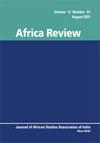移徙和区域合作促进发展:展望西非经共体
IF 0.5
Q4 AREA STUDIES
引用次数: 0
摘要
移民现象是指人们从一个环境迁移到另一个环境。人们迁徙的原因各不相同,如逃离冲突、寻求更绿色的牧场、寻找就业机会以及来自犯罪集团的胁迫。本文的重点是西非区域内移民的动态。该地区的发展议程《2020年愿景》强调了西非内部移民的重要性,该议程重视区域资源开发。移民便利对于利用该区域的人力资源潜力促进发展至关重要。一开始,西非境内的移徙受1979年通过的西非经共体关于人员、居住和机构自由流动的议定书管辖。在这个框架内,移徙被认为是该区域经济一体化的一个组成部分。因此,议定书规定了西非经共体成员国公民入境90天、居住和定居的权利。2008年通过的西非经共体共同移民办法目前管理着该地区的移民进程。在研究西非的移民治理时,本文指出了一些挑战,如国家能力缺陷和持续的不发达、保护主义政策、语言、殖民残余(如货币)等,这些都是阻碍该地区为发展目的成功利用生产性人口的因素。本文章由计算机程序翻译,如有差异,请以英文原文为准。
Migration and regional cooperation for development: ECOWAS in perspective
ABSTRACT The phenomenon of migration involves the movement of people from one milieu to another. Different reasons underscore this movement by people such as escape from conflict, quest for greener pasture, search for employment, and coercion from criminal syndicates. This paper focuses on the dynamics of intra-regional migration in West Africa. The importance of migration within West Africa is emphasized in the region’s development agenda, Vision 2020, which places importance on regional resource development. Ease of migration is central to harnessing the region’s human resource potential for development ends. At inception, migration within West Africa was governed by the ECOWAS protocol on free movement of persons, residence, and establishment adopted in 1979. Within this framework, migration is considered as an integral element in the economic integration of the region. Hence, the protocol provides the right of entry for 90 days, residence and establishment for citizens of ECOWAS member countries. The ECOWAS Common Approach on Migration adopted in 2008 currently governs the migration process in the region. In interrogating migration governance in West Africa, this paper identifies challenges, such as, defective state capacities and continued underdevelopment, protectionist policies, language, colonial vestiges, such as, currency, among others, as factors militating against the successful exploitation of the region’s productive population for development ends.
求助全文
通过发布文献求助,成功后即可免费获取论文全文。
去求助
来源期刊

Africa Review
AREA STUDIES-
CiteScore
1.80
自引率
12.50%
发文量
22
期刊介绍:
Africa Review is an interdisciplinary academic journal of the African Studies Association of India (ASA India) and focuses on theoretical, historical, literary and developmental enquiries related to African affairs. The central aim of the journal is to promote a scholarly understanding of developments and change in Africa, publishing both original scholarship on developments in individual countries as well as comparative analyses examining the wider region. The journal serves the full spectrum of social science disciplinary communities, including anthropology, archaeology, history, law, sociology, demography, development studies, economics, education, gender studies, industrial relations, literature, politics and urban studies.
 求助内容:
求助内容: 应助结果提醒方式:
应助结果提醒方式:


